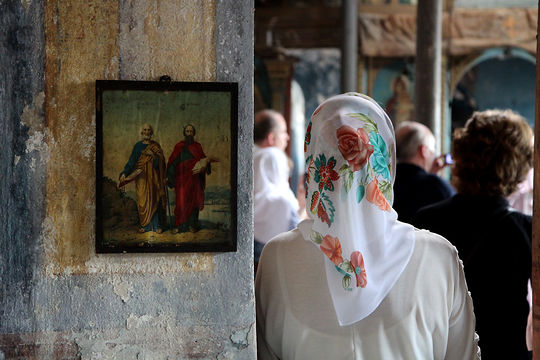
A worshipper attends a service in the Hagia Elia Church, which opened its door after 41 years in a bid to save it from developers. The Russian Orthodox church was erected on the top of a five-story building in Istanbul’s downtown port district of Karaköy. (Photo: Matilda Pinon)
In June, Turkey experienced the worst anti-government protests in decades over plans to redevelop Gezi Park in central Istanbul. Now, a historic church once used by Russian refugees fleeing the 1917 Bolshevik Coup is at the center of a fresh controversy over the city’s development ambitions.
Built on top of a five-story building, Hagia Elia is located in the downtown port district of Karaköy. The 19th century building, featuring a magnificent vista of the surrounding neighborhood, originally served as a hostel for Russian pilgrims heading to Jerusalem and Greece. Karaköy these days is no longer a hub for religious pilgrims heading to Jerusalem, but, rather, a hub for shipborne tourists. Just a few hundred meters away from Hagia Elia, some of the world’s largest cruise liners regularly dock and dump thousands of tourists onto the streets of Istanbul.
In May, the government sold to Turkey’s Doğuş Group for an eye-popping $702 million the right to redevelop part of the Karaköy area into a high-end tourism hub. There are plans for shopping malls, high-end restaurants and boutiques, and five-star hotels.
Yet the precise details of the project remain shrouded in secrecy. The Doğuş Group declined to comment to EurasiaNet.org about what its development plans could mean for the future of Hagia Elia. The city district administration’s development plan, meanwhile, does not recognize the existence of the church, which closed in 1971 because of a dwindling congregation.
In a bid to help protect the church, Hagia Elia re-opened its doors in early August, enabling it to obtain designation as a historic structure. The reopening followed the July 20 commemoration day of the church’s namesake saint (Elia, or Elijah), but the timing had more to do with the imminent threat of redevelopment.
“There was an idea to destroy this building for building a hotel. If you destroy this building and make a hotel, you can easily make 5 or 10 million dollars,” said Ivan Denizenko, head of Fukara Perver, a local Russian-Orthodox charity. “Before, it was a trade building, as a trade building you can demolish it. But if it’s an historical building, [according to] Turkish laws you cannot destroy it.”
Denizenko believes that now that Hagia Elia has been registered as an historical building, “we have saved the church.”
At its reopening, for the first time in more than 40 years, the church resonated with the sounds of Orthodox hymns. Although the ceiling and walls were in disrepair, with frescoes barely visible, covered in a thick layer of decades of soot and dirt, the church’s golden icons remain in immaculate condition.
A few dozen people attended, including diplomats from the nearby Russian consulate. For many, Hagia Elia symbolizes Russia’s turbulent past.
“It’s a very important church because it was one of the first churches from the Russian … aristocracy, when they came after the [Bolshevik] revolution,” commented 50-year-old Olga. Crimea was the last bastion of anti-Bolshevik forces in southern Russia to fall during the country’s 1918-21 civil war. Turkey, easily accessible via the Black Sea, was an obvious destination for the tens of thousands of refugees who fled amid the advance of the Red Army.
The Ecumenical Patriarchate of the Greek Orthodox Church is supporting efforts to protect Hagia Elia. The Greek church has been responsible for Hagia Elia, along with two sister churches in Karaköy, since the 1930s, when tension between Turkey and the Soviet Union prompted Istanbul’s ethnic Russian community to hand over the church to the Ecumenical Patriarchate for safeguarding.
The future of Hagia Elia, along with its sister churches, remains far from secure. Arguing that the Karaköy tourism hub will mean more jobs and prosperity for Istanbul, Turkish Prime Minister Recep Tayyip Erdoğan strongly backs the redevelopment project.
Tenants in the area already have received legal notices to vacate their premises. For now, Hagia Elia has not received an eviction order.
Naki Demirçivi, one of a group of lawyers representing the church, said that previous experience in fighting city re-development schemes does not offer much hope for Hagia Elia’s preservation. “Ultimately, the developer can do whatever he wants to do. There are many ways of circumventing restrictions. All we can do is delay their plans,” Demirçivi claimed.
For some of those attending the early August services at Hagia Elia, the redevelopment of the Karaköy neighborhood, with its century-old churches, could prove just as contentious as Gezi Park.
“This [Karaköy redevelopment] is an enormous project [and] they don’t tell you what is going to happen,” said 40-year-old parishioner Maria. “We feel very bad because what they [are] doing in Istanbul now is terrible. They are going to ruin the city. They don’t have any respect for the city, for the architecture.”
For Deacon Vissarion, who conducted Hagia Elia’s reopening service, saving the church is important not only for Istanbul’s small Russian-Orthodox population, but for everyone living in the city. “[The church] is a very basic part of the multi-cultural part of Constantinople, of Istanbul,” he said.
Source: Eurasianet.org













